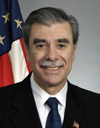
- Afghanistan
- Africa
- Budget Management
- Defense
- Economy
- Education
- Energy
- Environment
- Global Diplomacy
- Health Care
- Homeland Security
- Immigration
- International Trade
- Iraq
- Judicial Nominations
- Middle East
- National Security
- Veterans
- President's Cabinet
- USA Freedom Corps
- Faith-Based & Community Initiatives
- Office of Management and Budget
- National Security Council
- USA.gov
|
Welcome to "Ask the White House" -- an online interactive forum where you can submit questions to Administration officials and friends of the White House. Visit the "Ask the White House" archives to read other discussions with White House officials.
|
|
|
August 12, 2008
Carlos Gutierrez
Thank you for joining me today on "Ask the White House." Today is "Trade Day," the day the Department of Commerce releases trade data for the first half of 2008. Last year, exports accounted for a record 12 percent of our gross domestic product. Today there’s good news to report: exports of goods and services were up 18.8 percent year-to-date through June, and our trade deficit continues to narrow. Trade continues to be an important contributor to our economy. Free trade agreements (FTAs) increase trade flows and boost U.S. exports. In fact, exports have increased with every country with which the United States has an FTA. When you combine all the FTAs implemented during the Bush Administration, we’ve grown our trade surplus with these countries from $3.8 billion in 2000, to $21.0 billion in 2007. Now, Congress has an opportunity to even the playing field for American exporters with democratic allies Colombia, Panama and South Korea. Now more than ever, these FTAs are critical to America’s continued growth and competitiveness. I look forward to your questions. Russell, from Seattle writes: Carlos Gutierrez FTAs have proved to be one of the best ways to open up foreign markets to U.S. exporters. Trade agreements also encourage foreign governments to adopt open and transparent business and investment practices and strengthen the climate for business. FTAs can also help accelerate a country’s economic growth by allowing greater competition, encouraging the formation of international partnerships, and by greatly liberalizing many industries with high-growth potential.
It is important to note that while we have trade with many countries, including China, India and Russia, we only have free trade agreements currently in place with 14 countries. Often the countries with which we have trade challenges are countries with which we do not have FTAs. FTAs help clarify the rules and provide a level playing field for Americans to compete fairly. Congressional approval of the pending FTAs with Colombia, Panama and South Korea would give U.S. companies and workers greater access to 100 million consumers. Linda, from Ocala, Fl
writes: Carlos Gutierrez Gaston, from Washington, DC
writes: Carlos Gutierrez
More than 16 years ago, Congress passed the Andean Trade Preferences Act, giving Colombia and other Andean nations preference to our market—one-way free trade, if you will. The Colombia free trade agreement will make our trading relationship with Colombia two-way free trade, giving U.S. businesses, workers and farmers the same preferences that Colombia has historically enjoyed. President Bush notified Congress of his intent to sign the U.S.-Colombia FTA on August 24, 2006. The U.S. and Colombia signed the Agreement on November 22, 2006, but both countries need to pass implementing legislation before the agreement can enter into force. The agreement has been languishing on Capitol Hill for 630 days, while American exports to Colombia alone have faced nearly $1.2 billion in tariffs. Kim, from Kentucky writes: Carlos Gutierrez William, from Overland Park, KS
writes: Carlos Gutierrez
The free trade agreement is expected to create jobs and provide economic opportunities in legitimate industries throughout Colombia, thereby lessening employment in the informal sector where the rule of law is not enforced and working conditions go largely unchecked. Additionally, the FTA includes ground-breaking labor provisions that will help further progress that has already been made on labor laws and enforcement, and also provides for civil society participation in such processes. Colombia is a country that has experienced a tremendous turnaround. Under President Uribe, homicides have dropped 40 percent, kidnappings by 83 percent and terrorist attacks by 76 percent. And, Colombia’s economy has grown tremendously—6.9 percent last year alone—while unemployment and poverty are at their lowest levels in decades. Continued economic growth will create higher paying jobs in Colombia, thereby improving the standard of living for Colombians. We have a better opportunity to help create stronger labor rights with a permanent FTA than without one.
Cliff, from Brimfield, Ohio writes: Carlos Gutierrez Moshe, from New York writes: Looking forward to your response. Thank you. Carlos Gutierrez
If you’d like more information about the Forum, please visit: www.competitivenessforum.com. Brett, from Vienna, West Virginia writes: Carlos Gutierrez Colombia will also most likely increase their trade with other countries. For example, Canada has just signed an FTA with Colombia. Unless we approve our FTA soon Colombia will buy products, such as wheat, from Canada instead of us.
Carlos Gutierrez Thank you for participating in today’s “Ask the White House.” While there’s good news in today’s trade numbers, we can’t be complacent. The United States remains the world’s largest exporter. However, it is imperative we do everything we can to give our exporters the edge they need when competing in the global marketplace. This means encouraging innovation, lowering barriers to exports and providing the energy a growing economy needs. Today’s trade numbers show how much international commerce is changing our economy—and the world’s. We’ve been a leader in creating the increasingly interconnected world in which we live. Now we have the opportunity to continue on that path if we make the right policy choices today. That means passing pending trade agreements, expanding opportunities abroad, investing in developing innovative technologies and tapping into energy resources here at home. |




